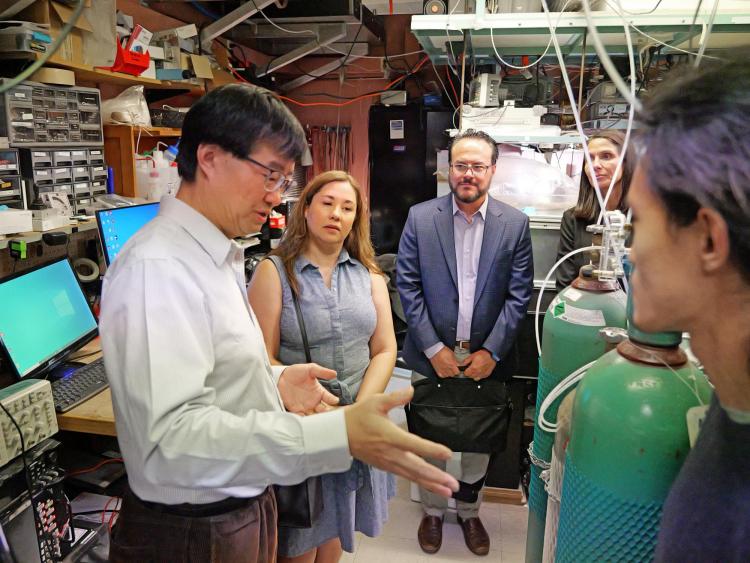Colorado Rep. Yadira Caraveo visits CU Boulder to talk quantum
Colorado Congresswoman Yadira Caraveo dipped into all-things quantum July 3 as she made her first official visit to CU Boulder and JILA, a joint institute between the National Institute of Standards and Technology (NIST) and CU Boulder.
As a member of the House Committee on Science, Space, and Technology arriving on campus only a day after it was announced that the Mountain West is receiving a $127 million infusion to bolster quantum technology and workforce, the discussion was energized and timely. The committee oversees vital policies related to the National Science Foundation (NSF), NASA, National Oceanic and Atmospheric Administration (NOAA), and NIST. The committee also handles several aspects of federal quantum policy.

Colorado Rep. Yadira Caraveo gets a tour of Jun Ye’s lab in JILA
“I am really looking forward to continued partnership with you all,” said Caraveo after hearing about a range of quantum initiatives on campus and across the region and taking notes. “I’m going to get down to work making sure these agencies are well-funded.”
She was joined by university leaders, including Chancellor Justin Schwartz, Vice Chancellor for Research Massimo Ruzzene, Dean of the College of Engineering and Applied Science Keith Molenaar, and notable researchers and professors, including JILA Fellow John Bohn, JILA and NIST Fellow Jun Ye, Mike Gooseff, Scott Diddams, Greg Rieker, CUbit Quantum Initiative Director Scott Sternberg and representatives Laura Buccini and Dan LaBarbera from the University of Colorado Anschutz Medical Campus.
“In my short time at CU so far, I have had the privilege of taking part in the exciting work that the university, in partnership with government and industry, is doing to build the quantum ecosystem in Colorado,” said Schwartz, who began his post as CU Boulder’s 12th chancellor on July 1. “It is a very exciting time and one of the reasons I was so excited to join the CU Boulder community.”
Schwartz also expressed gratitude to Caraveo for her leadership on the House Science Committee, which is leading the 118th Congress in updating the National Quantum Initiative Act, and offered the university’s support for passing the bill this year. The law, which has accelerated federal research in quantum, expired in 2023.
“CU appreciates the inclusion of many of our priorities in the House reauthorization bill, including expanded NIST partnerships in quantum sensing and quantum engineering, ensuring the current NSF quantum institutes are renewable, creating a new quantum center opportunity at NASA, and authorizing new NSF programs to expand efforts in education, translation, capacity building and infrastructure,” Ruzzene said.
In addition to giving her a better understanding of the latest advancements and challenges in quantum science, the campus conversation emphasized the critical role of ongoing federal support in continuing the United States' leadership in quantum research and innovation.
Colorado’s growing quantum hub
Caraveo is one of many Colorado leaders who has recently visited CU Boulder and JILA to discuss ongoing efforts in quantum research.
Colorado is rapidly establishing itself as a quantum research and innovation hub, with CU Boulder playing a key role in helping to spawn many local quantum computing startup companies. The state government estimates the quantum industry could add thousands of jobs to Colorado over the next decade.
Just the day before, the U.S. Economic Development Administration announced that Elevate Quantum, of which CU Boulder is a key partner, received a Tech Hub Phase 2 implementation award from the Department of Commerce, unlocking more than $127 million in new federal and state funding.


